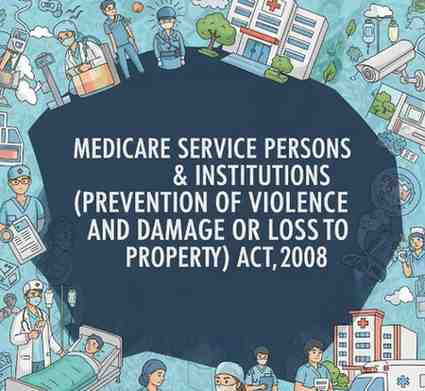
Your Account
Designed by Zeptt Technologies

The Medicare Service Persons and Medicare Service Institutions (Prevention of Violence and Damage or Loss to Property) Act, 2008 is a legislative framework enacted to protect healthcare professionals and healthcare institutions from violence.
This Act was introduced due to increasing cases of assaults on doctors, nurses, and damage to hospital property.
The Act is currently implemented in several Indian states including Maharashtra, Karnataka, Andhra Pradesh, and others.
OBJECTIVES OF THE ACT
To prevent violence against healthcare professionals (doctors, nurses, paramedics, etc.).
To protect the property of medical institutions like hospitals, clinics, and diagnostic centers.
To instill a sense of legal security among medical service providers.
DEFINITIONS UNDER THE ACT
Medicare Service Persons: Includes registered medical practitioners, nurses, paramedics, and other staff working in government or private medical institutions.
Medicare Service Institutions: Includes hospitals, nursing homes, clinics, dispensaries, diagnostic centers, and other such institutions providing healthcare services.
Violence: Any act that causes harm, obstruction, or endangers the life or health of medical personnel, including physical assault, intimidation, or damage to property.
KEY PROVISIONS OF THE ACT
Any act of violence or damage to property in a medicare institution is a cognizable and non-bailable offense.
The punishment for the offense includes:
Imprisonment up to 3 years
Fine up to ₹50,000
Offenders are liable to compensate for damage or loss to the property.
The investigation of such offenses is to be completed within a specific time frame to ensure speedy justice.
NEED FOR THE ACT
Increasing incidences of mob violence in hospitals.
Rising threats and assault cases against doctors and medical workers.
Psychological and physical impact on healthcare professionals.
Disruption of essential emergency services and healthcare delivery.
Erosion of trust and morale among medical fraternity.
ROLE OF POLICE AND ADMINISTRATION
Police must register a case immediately under relevant sections of this Act.
Quick action and investigation are mandated.
District administration must ensure safety and law enforcement in healthcare institutions.
RELEVANCE IN MODERN FORENSIC TOXICOLOGY
Falls under Legal Aspects in Medical Practice.
Studied under Medical Jurisprudence and Ethics in modern medical and BAMS curricula.
Forensic experts are called to assess and document injuries during medico-legal cases involving violence.
Protects medico-legal evidence and continuity of medical care in emergency cases.
Relevance during mass casualties, poisoning outbreaks, medico-legal autopsies, etc.
RELATED MODERN MEDICO-LEGAL POINTS (From Forensic Medicine Textbooks like Reddy's, Parikh’s, etc.)
Doctor-Patient Relationship: Any act that causes breakdown in this trust can endanger both patient care and physician safety.
Negligence vs Violence: Dissatisfaction with treatment does not legally justify violence.
Hospital Security: Need for CCTV, guards, and panic alert systems.
Informed Consent & Communication: Clear communication reduces misunderstandings that lead to aggression.
Role of MLC (Medico-Legal Case): Proper documentation in case of violence ensures legal accountability.
AYURVEDIC PERSPECTIVE AND SANSKRIT REFERENCES
Physician’s protection and duties are mentioned in Ayurveda to ensure uninterrupted treatment to patients.
“Vaidyo narayanahari”
(A physician is like God to the patient – an ancient sentiment reflecting respect and importance.)
"व्याधितस्य हि यः साक्षाद् भवेत् जीवनहेतवः।
वैद्यः स एव भिषग्वृन्दैः पूज्यः स्यात् प्रयत्नतः॥"
— Charaka Samhita, Vimana Sthana 8/3
(One who directly becomes the cause of life for a diseased person is the physician and should be respected earnestly.)
"न हि वैद्यसमो राजा न च चक्षु: समं प्रदीपम्।
न च धर्म: समो मित्रं न च शीलात्परं तपः॥"
— Ashtanga Hridaya, Sutrasthana
(No king is equal to a physician, just as no lamp is equal to the eye, no friend like dharma, and no austerity higher than character.)
These verses illustrate the ancient Indian value for respect and safety of the medical professional, which aligns with the objectives of this modern law.
IMPORTANCE FOR BAMS GRADUATES AND AYURVEDIC PRACTITIONERS
Ensures legal protection while practicing in Ayurvedic hospitals and clinics.
Awareness of this Act helps in seeking justice in cases of aggression.
Relevant for internships, emergency duty postings, rural practice, and private consultations.
Encourages safe and ethical medical practice.
PREVENTIVE STRATEGIES AND RECOMMENDATIONS
Better doctor-patient communication and counseling.
Prompt attention to grievances.
Awareness campaigns about legal consequences of violence.
Installation of surveillance and security systems in hospitals.
Institutional support and legal training for interns and fresh graduates.